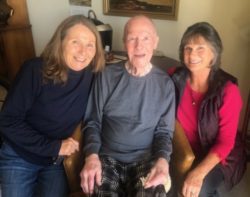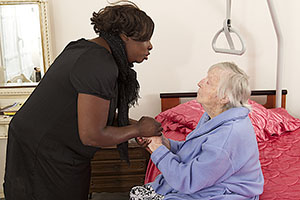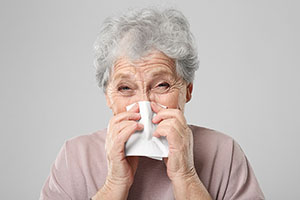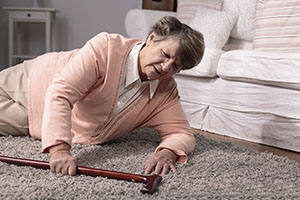Make an Appoinment
October, 2018 | Elderlink Home Care
Elderlink is very happy to announce the winner of our ‘Celebrating 30 Years’ grant for September, 2018 – Mr. Edwin Bubla! Mr. Bubla was born in St. Louis, Missouri and has called Colorado home for the past 30 years. When he was 18, he joined the Army then worked on the railroad as a signal maintainer, retiring after 32 years. Mr. Bubla and his late wife, Bernadine, were married for 47 years! His favorite place he’s ever visited is Italy, which he was able to see while stationed there in the Army. Ed loves football and the Broncos. When asked what he wanted to do with his $300 reward? “A new shaver and maybe a case of Budweiser!”. Good choice Mr. Bubla and again, congratulations to you!
Caregiving for an elderly client or loved one is an honor and a privilege, but it can also be incredibly difficult at times. In many cases, you’ll find yourself feeling overwhelmed or struggling with whether or not you’re going to be able to do enough in your life. Being prepared for those challenges and knowing what to expect can help you overcome them–or at least offer a little more perspective on what’s needed to care for the senior in your life. Problem #1: Being Overwhelmed with Chores Caring for an elderly loved one means taking care of a wide range of chores, including the day-to-day care around their home. Chances are, you’re already taking care of those tasks around your own home, which means that when you’re caring for an elderly loved one, the responsibilities are doubled. Those responsibilities can quickly become extremely overwhelming. Organization is key to maintaining your schedule. It’s also important to know when its time for some outside help. Problem #2: Financial Concerns You wouldn’t put a cost on caring for your aging parent for the world, but that doesn’t mean that it isn’t expensive. If your parent’s money is limited or they didn’t properly plan for retirement, all the family members may need to kick in to help provide care. Unfortunately, you may see financial stress from both sides: while you’re working hard to care for them, it can be hard for you to put in the hours you need at work, too. Problem #3: Feelings of Isolation If you are the primary caretaker for a loved one who needs daily care, you’re with them constantly–and that can quickly lead to social stress. You’re isolated from your friends, your social life, and even other family members. Its important to remember to make time for yourself and take care of your needs. Problem #4: Exhaustion In some cases, caregiving may require physical exertion. Not only that, you have increased responsibilities resting on your shoulders and little time to complete them all. With stress levels mounting, it’s little wonder that many caregivers report feelings of exhaustion that only grow as caregiving continues. Problem #5: Guilt “Mom guilt” is a familiar challenge for many women: they’re trying to give as much as they can to their families, but they’re also stretched in many different directions. Caregivers often experience similar guilt. You may feel guilty because you aren’t doing more, guilt for the things that you’re neglecting in order to provide care for your senior loved one, and even guilt for feeling resentful of the things you’ve been asked to do. Worse, you’re struggling to make enough time for your other family members and relationships, and may struggle with constant feelings of guilt. Caring for a senior loved one can be incredibly challenging. It’s not something you have to face alone! In-home care can make it much easier to ensure your loved one’s needs are being met – as well as your own. If you’re struggling to provide care for your senior loved one by yourself or if you need a break, contact us. We’ll work with you to ensure that your loved one is cared for, giving you the peace of mind you deserve.
Flu season is fast approaching, and with it, come a number of potential dangers for seniors. The flu is more dangerous for seniors than it may be for others: seniors account for more than half of hospitalizations for flu symptoms. Not only that, when seniors get the flu, they may face more severe health ramifications after the illness than an otherwise healthy adult. For months after, seniors may be at a higher risk for heart attack, stroke and other types of disabilities. This makes flu prevention important for everyone, particularly the senior community. These tips will help you and your elderly loved ones stay healthy this flu season. Step One: Get a Flu Vaccine Getting the flu shot is the most effective way to combat the flu. While the flu shot is not 100% effective in preventing all strains of the flu, it can greatly reduce the risk that you’ll end up sick–and even if you do get the flu, your symptoms may be less severe. In spite of the fact that their immune response decreases with age, seniors respond as well to the flu shot as other age groups, making this the critical first response in your battle to stay healthy this cold and flu season. Step Two: Wash and Sanitize Your Hands Regularly Viruses are everywhere. The most common way to pick them up, other than being in the presence of someone who is coughing or sneezing, is through your hands. Simply handling items in a store or using a doorknob can expose you to flu germs. Make a habit of washing and sanitizing your hands regularly, and avoid touching your eyes, nose, and mouth until your hands are washed and sanitized. Step Three: Build Your Immune System Your immune system is a complex system that depends greatly on your overall health. As you move into cold and flu season, look for ways to help boost your immune system. This might include: Eating plenty of healthy fruits and vegetables and decreasing sugar consumption Make sure you are getting enough sleep every night Exercise regularly: at least 30 minutes 5 times a week Take supplements that will help build your immune system. Elderberry and vitamin C are both great choices. Step Four: Maintain a Clean Environment Fighting the flu and other viruses requires constant vigilance. While you can’t keep your environment 100% clean, 100% of the time, you can take the time to wipe down surfaces and keep your home as clean as possible. Change air filters regularly, make sure to wipe down counters, and spend some extra time cleaning after you’ve had guests. Step Five: Take Precautions Avoiding crowded areas during cold and flu season can go a long way towards keeping you healthy. When that’s not possible, consider wearing a face mask, which can decrease your exposure to dangerous germs. Avoid people who are sick, even if it means turning down an invitation to spend time with family: your health is worth it! Step Six: Stay Hydrated Drinking plenty of water and staying hydrated is important when it comes to ensuring your immune system is functioning at the right level. Keep a water bottle with you and refill it often throughout the day. Make sure that you’re drinking plenty of water, not just soda or juice. Avoiding the flu this season can be a challenge, but it’s one that’s worth the effort. Do you or a loved one need assistance with everyday living activities? Elderlink Home Care is here to help. Contact us today to learn more about our services and how we can help!
Most seniors would prefer to live at home for as long as possible–and you like the idea of having your senior loved one in their home for as long as possible. Unfortunately, living at home can add several increased risks to what your loved one faces every day. If your loved one is still living at home, make sure that both of you fully understand the risks so if the time comes where additional in-home assistance is needed to ensure your loved one’s safety, you are well-prepared for the change. Risk #1: Isolation Many seniors find themselves living home alone after their spouse has passed away. This can leave them isolated from the outside world, especially if they don’t regularly go out with friends or if they’re no longer able to drive. Unfortunately, social isolation doesn’t just impact your mental health. It can also cause a decreased lifespan, a higher risk of heart ailments and an increased risk of physical issues as your loved one ages. Risk #2: Increased Risk of Injuries As seniors age, their risks of falling and other traumatic injuries rise along with them. Poor eyesight, limited mobility and safety hazards throughout the house can make it difficult to safely perform the daily tasks of living. Seniors who live alone are at increased risk of injury, since there’s no one to help take care of those important tasks for them. It’s also important to consider how injuries might be handled if there’s no one in the home to notice and your loved one is unable to call for help. Risk #3: Medications Many seniors discover that their memory is one of the first things to fail them. Sometimes, it’s as simple as walking into a room and forgetting why they’re there. Managing medications properly with poor memory can be an ongoing struggle and frankly, can be very dangerous. Seniors may forget whether or not they’ve taken their medications, leading to over- or under-dosing. This can lead to serious health complications, especially in seniors with significant medical conditions that require regular medication, monitoring and care. Risk #4: Becoming a Target Many scammers have learned that seniors living at home alone are an easier target for their scams. Seniors are more likely to give out financial information over the phone or to respond to a plea for help. Scammers may pretend to be a grandchild or other loved one in trouble in an effort to get seniors to give out personal information, which can then leave them suffering financially. Risk #5: Failing Health Due to Malnutrition Seniors who live at home alone run an increased risk for malnutrition. They may have poor diets, from struggling to remember whether or not they’ve eaten to choosing unhealthy sweets and other meals instead of healthier options. As appetite decreases or problems with chewing increase, seniors may opt to forego meals, which can in turn lead to malnutrition and other serious health problems. Risk #6: Higher Rates of Depression and Anxiety Seniors who live at home alone are at a higher risk to develop depression and anxiety. With too much time to think and not enough interaction with other people, it’s easy to become paranoid or to otherwise struggle with mental health. Depression and anxiety can in turn lead to very physical health problems. Do you have a senior loved one struggling to perform the tasks of daily living safely? Securing home care services can be a huge help and offer you priceless peace of mind. At Elderlink Home Care, we provide surprisingly affordable care for seniors who need assistance with the activities and tasks of daily living. If you or a loved in is in need of assistance, contact us today to learn more about the services we can provide.





